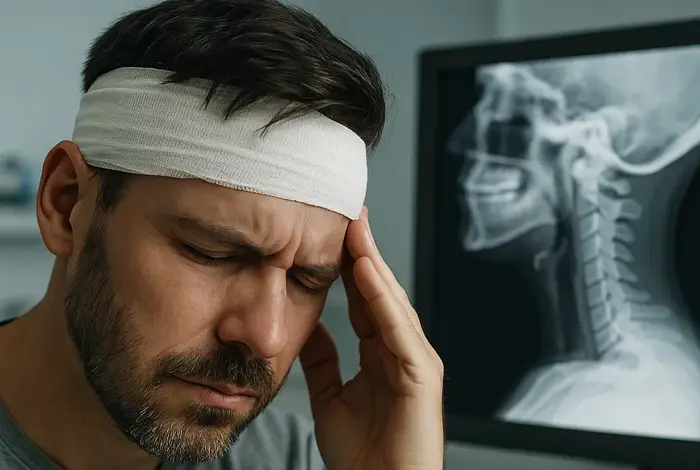It’s been weeks maybe even months since your concussion. The scans were “normal.” The doctors said you’d be fine.
But you’re still dizzy. Still foggy. Still not yourself.
If you’ve been told your symptoms are just part of post-concussion syndrome, but you feel like something deeper is going on…
You may be right.
At DMX Miami, we help patients who are still suffering long after a concussion by using Digital Motion X-Ray (DMX) an advanced tool that uncovers hidden instability in the neck that standard tests miss.
Concussion Symptoms That May Not Be “Just in Your Head”
Post-concussion syndrome can include:
- Dizziness or vertigo
- Light sensitivity
- Brain fog or mental fatigue
- Nausea
- Imbalance
- Neck pain or pressure
- Poor tolerance to screens, sound, or motion
Most doctors order a brain MRI or CT scan and when those come back normal, you’re told “it just takes time.”
But for many people, the real issue is in the neck, not the brain.
The Hidden Problem: Upper Cervical Instability
The C0–C1–C2 area where your skull meets the top two vertebrae is critical for:
- Head stability
- Brainstem and spinal cord protection
- Blood flow to the brain
- Balance and coordination
If a concussion or whiplash event damages the ligaments in this region, your vertebrae may shift excessively during motion causing persistent symptoms that won’t appear on static MRI or CT scans.
This is called cervical ligament instability, and it may be the missing link in your recovery.
What Is Digital Motion X-Ray (DMX)?
DMX is a dynamic imaging test that captures 30 X-ray frames per second as you move your neck.
Unlike traditional imaging, which shows only a still picture, DMX reveals:
- Instability during motion
- Alar or transverse ligament laxity
- Misalignment of vertebrae under stress
- Abnormal joint movement that explains your symptoms
It’s the only scan that shows how your neck truly functions.

When to Suspect Instability After a Concussion
You may need a DMX if:
- You have lingering dizziness after head trauma
- Your symptoms worsen when turning your head or changing positions
- Your MRI and neurological exams are normal
- Physical therapy hasn’t helped
- You’ve had whiplash, sports injury, or car accident with head movement involved
Even minor injuries can cause ligament laxity especially in athletes, accident victims, or those with hypermobility.
Who We Serve at DMX Miami
We welcome patients from:
- Miami, Fort Lauderdale, Orlando, and all of Florida
- Major U.S. cities like New York, Chicago, LA, Dallas
- Latin America & the Caribbean (Colombia, Panama, DR, Puerto Rico)
- Europe (UK, Germany, Spain, France)
DMX Miami offers:
- English & Spanish-speaking staff
- Fast appointments (same or next-day)
- Full report and motion video
- Coordination with neurologists, concussion clinics, and regenerative doctors
Planning PRP or Stem Cells?
Many post-concussion patients turn to regenerative medicine when nothing else helps.
DMX helps by:
- Pinpointing the exact ligament(s) involved
- Providing pre-treatment evidence of instability
- Helping guide accurate, targeted injection plans
Get Real Answers After Your Concussion
If you’re still dizzy, foggy, or off balance and no one can tell you why it’s time for a test that looks at the neck in
Call 305-275-7475 or book your appointment online

Dr. Rodolfo Alfonso, D.C.
Dr. Mark N. Berry, D.C.
Sunset Chiropractic and Wellness
8585 Sunset Dr. STE 102
Miami, Florida 33143
305-275-7475
Schedule Your DMX Today
You’ve been searching for answers. Now you can see the cause of your symptoms in motion.
Visit us in Miami
Call 305-275-7475
Request an appointment online
Follow us on Instagram, Facebook, and YouTube for updates, patient success stories, and expert insights on neuropathy treatment!
